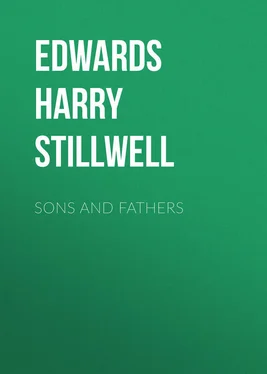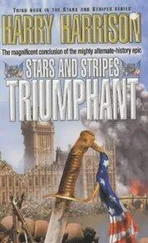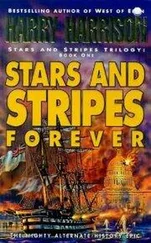Harry Edwards - Sons and Fathers
Здесь есть возможность читать онлайн «Harry Edwards - Sons and Fathers» — ознакомительный отрывок электронной книги совершенно бесплатно, а после прочтения отрывка купить полную версию. В некоторых случаях можно слушать аудио, скачать через торрент в формате fb2 и присутствует краткое содержание. Жанр: foreign_antique, foreign_prose, на английском языке. Описание произведения, (предисловие) а так же отзывы посетителей доступны на портале библиотеки ЛибКат.
- Название:Sons and Fathers
- Автор:
- Жанр:
- Год:неизвестен
- ISBN:нет данных
- Рейтинг книги:5 / 5. Голосов: 1
-
Избранное:Добавить в избранное
- Отзывы:
-
Ваша оценка:
- 100
- 1
- 2
- 3
- 4
- 5
Sons and Fathers: краткое содержание, описание и аннотация
Предлагаем к чтению аннотацию, описание, краткое содержание или предисловие (зависит от того, что написал сам автор книги «Sons and Fathers»). Если вы не нашли необходимую информацию о книге — напишите в комментариях, мы постараемся отыскать её.
Sons and Fathers — читать онлайн ознакомительный отрывок
Ниже представлен текст книги, разбитый по страницам. Система сохранения места последней прочитанной страницы, позволяет с удобством читать онлайн бесплатно книгу «Sons and Fathers», без необходимости каждый раз заново искать на чём Вы остановились. Поставьте закладку, и сможете в любой момент перейти на страницу, на которой закончили чтение.
Интервал:
Закладка:
"Dear Jim," he began, selecting a well-known friend of his father, and a companion in arms. "You have probably noticed in the Journal the announcement of my candidacy for the congressional nomination. The boys of the old 'Fire-Eaters' did eat. I am counting on you; you stood by me at Seven Pines, Fredericksburg, Chancellorsville and a dozen other tight places, and I have no fear but that your old colonel will find you with him in this issue. It is the old south against the riffraff combination of carpetbaggers, scalawags and jaybirds who are trying to betray us into the hands of the enemy! My opponent, Swearingen, is a good man in his way, but in devilish bad company. See Lamar of Company C, Sims, Ellis, Smith and all the old guard. Tell them I am making the stand of my life! My best respects to the madam and the grandchildren! God bless you. Do the best you can. Yours fraternally,
"N. L. Montjoy.""P. S. Arrange for me to speak at your court house some day soon. Get an early convention called. We fight better on a charge – old Stonewall's way.
"N. L. M."This letter brought down the house; the house in this instance standing for a small army of committeemen gathered at headquarters. Norton was encouraged to try again.
"The Rev. Andrew Paton, D. D. – Dear Andrew: I am out for congress and need you. Of course we can't permit you to take your sacred robes into the mire of politics, but, Andrew, we were boys together, before you were so famous, and I know that nothing I can bring myself to ask of you can be refused. A word from you in many quarters will help. The madam joins me in regards to you and yours. Sincerely.
"N. L. Montjoy.""P. S. Excuse this typewritten letter, but my hand is old, and I cannot wield the pen as I did when we put together that first sermon of yours.
"M."This was an addendum in "the colonel's own handwriting" and it closed with "pray for me." The letter was vociferously applauded and passers-by looked up in the headquarters windows curiously. These addenda in the colonel's own handwriting tickled Norton's fancy. He played upon every string in the human heart. When he got among the masons he staggered a little, but managed to work in something about "upright, square and level." "If I could only have got a few signals from the old gentleman," he said, gayly, "I would get the lodges out in a body."
Norton was everywhere during the next ten days. He kept four typewriters busy getting out "personal" letters, addressing circulars and marking special articles that had appeared in the papers. One of his sayings that afterward became a political maxim was: "If you want the people to help you, let them hear from you before election." And in this instance they heard.
Within a few days a great banner was stretched across the street from the headquarters window, and a band wagon, drawn by four white horses, carried a brass band and flags bearing the legend:
"Montjoy at the Court House
Saturday Night."
Little boys distributed dodgers.
Edward, taking the cue, entered with equal enthusiasm into the comedy. He wanted to do the right thing, and he had formed an exaggerated idea of the influence of money in political campaigns. He hung a placard at the front door of the Montjoy headquarters that read:
"One thousand dollars to five hundred that Montjoy is nominated."
He placed a check to back it in the secretary's hands. This announcement drew a crowd and soon afterward a quiet-appearing man came in and said:
"I have the money to cover that bet. Name a stake-holder."
One was named. Edward was flushed with wine and enthused by the friendly comments his bold wager had drawn out.
"Make it $2,000 to $1,000?" he asked the stranger.
"Well," was the reply, "it goes."
"Make it $10,000 to $5,000?" said Edward.
"No!"
"Ten thousand to four thousand?"
"No!"
"Ten thousand to three thousand?"
"No!" The stranger smiled nervously and, saluting, withdrew. The crowd cheered until the sidewalk was blockaded. The news went abroad: "Odds of 300 to 100 have been offered on Montjoy, and no takers."
Edward's bet had the effect of precipitating the campaign in the home county; it had been opening slowly, despite the rush at the Montjoy headquarters. The Swearingen men were experienced campaigners and worked more by quiet organization than display. Such men know when to make the great stroke in a campaign. The man who had attempted to call young Morgan's hand had little to do with the management of the Swearingen campaign, but was engaged in a speculation of his own, acting upon a hint.
But the show of strength at the Montjoy headquarters was at once used by the Swearingen men to stir their friends to action, lest they be bluffed out of the fight. Rival bands were got out, rival placards appeared and handbills were thrown into every yard.
And then came the first personalities, but directed at Edward only. An evening paper said that "A late citizen, after half a century of honorable service, and although but recently deceased, seemed to have fallen into betting upon mundane elections by proxy." And elsewhere: "A certain class of people and their uncle's money are soon divorced." Many others followed upon the same line, clearly indicating Edward Morgan, and with street-corner talk soon made him a central figure among the Montjoy forces. Edward saw none of these paragraphs, nor did he hear the gossip of the city.
This continued for days; in the meantime Edward took Norton home with him at night and generally one or two others accompanied them. Finally it came to be settled that Norton and Edward were old friends, and the friends of Montjoy senior looked on and smiled.
The other side simply sneered, swore and waited.
Information of these things reached Mary Montjoy. Annie, the sister-in-law, came into the city and met her cousin, Amos Royson, the wild horseman who collided with the Montjoy team upon the night of Edward's first appearance. This man was one of the Swearingen managers. His relationship to Annie Montjoy gave him entrance to the family circle, and he had been for two years a suitor for Mary's hand.
Royson took a seat in the vehicle beside his cousin and turned the horse's head toward the park. Annie Montjoy saw that he was in an ugly mood, and divined the reason. She possessed to a remarkable degree the power of mind-reading and she knew Amos Royson better than he knew himself.
"Tell me about this Edward Morgan, who is making such a fool of himself," he said abruptly. "He is injuring Col. Montjoy's chances more than we could ever hope to, and is really the best ally we have!"
She smiled as she looked upon him from under the sleepy lids, "Why, then, are you not pleased?"
"Oh, well, you know, Annie, the unfortunate fact remains that you are one of the family. I hate to see you mixed up in this matter and a sharer in the family's downfall."
"You do not think enough of me to keep out of the way."
"I cannot control the election, Annie. Swearingen will be elected with or without my help. But you know my whole future depends upon Swearingen. Who is Edward Morgan?"
"Oh, Edward Morgan! Well, you know, he is old John Morgan's heir, and that is all I know; but," and she laughed maliciously, "he is what Norton calls 'a rusher,' not only in politics, but elsewhere. He has seen Mary, and – now you know why he is so much interested in this election." Amos turned fiercely upon her and involuntarily drew the reins until the horse stopped. He felt the innuendo and forgot the thrust.
"You cannot mean – " he began, and then paused, for in her eyes was a triumph so devilish, so malicious, that even he, knowing her well, could not bring himself to gratify it. He knew that she had never forgiven him for his devotion to Mary.
"Yes, I mean it! If ever two people were suddenly, hopelessly, foolishly infatuated with each other that same little hypocritical chit and this stranger are the two. He is simply trying to put his intended father-in-law into congress. Do you understand?"
Читать дальшеИнтервал:
Закладка:
Похожие книги на «Sons and Fathers»
Представляем Вашему вниманию похожие книги на «Sons and Fathers» списком для выбора. Мы отобрали схожую по названию и смыслу литературу в надежде предоставить читателям больше вариантов отыскать новые, интересные, ещё непрочитанные произведения.
Обсуждение, отзывы о книге «Sons and Fathers» и просто собственные мнения читателей. Оставьте ваши комментарии, напишите, что Вы думаете о произведении, его смысле или главных героях. Укажите что конкретно понравилось, а что нет, и почему Вы так считаете.












